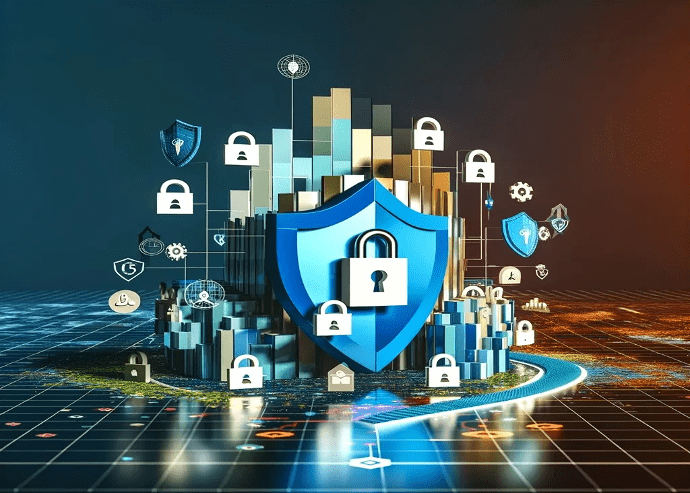
Law Firm Cybersecurity
Keeping up to date with cybersecurity is crucial for law firms because they handle sensitive client information, making them prime targets for cyberattacks. Maintaining strong cybersecurity measures ensures compliance with legal obligations to protect client data under regulations such as CCPA, GDPR, HIPAA and the ABA's ethical rules.
Protecting Client Confidentiality with Strong Cybersecurity
Good cybersecurity practices are essential for law firms to protect sensitive client information from unauthorized access and cyber threats. By implementing robust security measures, law firms can comply with legal and ethical obligations, preventing potential legal liabilities and enhancing client trust. Effective cybersecurity also mitigates the risk of damaging data breaches that can lead to significant financial losses and reputational harm, ensuring the firm's operational continuity and integrity.
Need compliance with standards & frameworks?
GDPR
GDPR: Novesh offers GDPR compliance services such as impact assessments, policy implementation, lawful data processing, and continuous support.
CCPA
CCPA: Novesh offers comprehensive CCPA compliance services to law firms, including assessments, policy development, security protocols, staff training, and regular audits.
HIPAA
HIPAA: Novesh provides HIPAA compliance services, including risk assessments, security measures, policy development, staff training, and audits for ongoing compliance.
Service Offerings for Legal Practices

Cybersecurity
Assessments
We offer cybersecurity services for law firms to measure the maturity, resiliency, and strength of your organization’s cybersecurity efforts to build your cybersecurity defense.

Maintain Ongoing Regulatory Compliance
As new regulatory challenges evolve, Novesh addresses key best practices outlined in standards frameworks like CCPA, GDPR, HIPAA, and others to provide essential IT support for law firms.

Vulnerability Scanning & Pen Testing
Deploy end-to-end security vulnerability scanning to close cybersecurity gaps, enhancing data security for law firms. This secures potential cyber threat entry points, safeguarding sensitive legal information.

Backup & Disaster Recovery
With our backup solutions and disaster recovery plan, your IT infrastructure is safeguarded from any unwanted guests, eliminating threats and managing vulnerability scans.
Frequently Asked Questions
- Phishing Attacks: Cybercriminals often use phishing emails to trick employees into revealing sensitive information or downloading malware. These emails can appear very convincing, mimicking legitimate communications from clients or other trusted sources.
- Ransomware: This type of malware locks access to a victim's data, demanding a ransom to restore access. Law firms are attractive targets for ransomware attacks because they often need immediate access to their data to continue operations and meet legal deadlines.
- Data Breaches: Unauthorized access to the firm’s data can occur through various means, including hacking, insider threats, or accidental disclosure. Such breaches can lead to the loss of client trust and significant legal repercussions.
- Insider Threats: Sometimes, the security risk can come from within the organization, whether through malice or negligence. Employees who have access to sensitive data can accidentally or intentionally leak information.
- Advanced Persistent Threats (APTs): These are prolonged and targeted cyberattacks in which an intruder gains access to a network and remains undetected for an extended period of time. The goal is usually to steal data rather than cause immediate damage.
- Expertise and Specialization: Novesh brings specialized knowledge and expertise in cybersecurity, providing access to dedicated professionals who stay up-to-date with the latest security threats and mitigation strategies.
- Comprehensive Security Solutions: Novesh offers a range of services from risk assessments and compliance audits to incident response planning and employee training. This comprehensive approach ensures all aspects of cybersecurity are addressed, from prevention to recovery.
- Cost-Effectiveness: By outsourcing cybersecurity needs to Novesh, law firms can reduce the cost associated with maintaining an in-house cybersecurity team, including hiring, training, and equipping staff with the necessary tools and technology.
- Enhanced Security Posture: Novesh helps law firms strengthen their security posture with advanced technologies and practices that may be too complex or resource-intensive to implement on their own.
- Compliance Assurance: Novesh assists in ensuring that law firms meet all relevant regulatory and compliance requirements, reducing the risk of fines and legal penalties.
- Focus on Core Business Activities: With Novesh handling cybersecurity, law firms can focus more on their core legal activities and client service, knowing their data security is in expert hands.
- Annual Audits: Most organizations conduct formal cybersecurity audits annually. This helps in keeping up with new threats and changes in compliance requirements.
- Biannual or Quarterly Risk Assessments: More frequent risk assessments (every six months or quarterly) can be beneficial for businesses in dynamic industries or those facing higher threats to ensure that their cybersecurity measures are continuously adequate.
- After Significant Changes: It's advisable to conduct additional risk assessments and possibly audits after implementing significant changes in the IT infrastructure, launching new products, or major updates to systems, to ensure that new vulnerabilities are not introduced.
- Regulatory Requirements: Specific industries, like finance or healthcare, have stringent regulatory requirements that might dictate the frequency of these audits. For example, the Payment Card Industry Data Security Standard (PCI DSS) requires annual audits and quarterly scans for organizations handling credit card information.
- Following a Security Incident: After a security breach or incident, conducting a thorough audit and risk assessment is crucial to identify and mitigate any remaining vulnerabilities to prevent future occurrences.
- Legal Repercussions: Non-compliance with data protection laws such as GDPR, CCPA, and others can result in hefty fines and legal penalties. Law firms are required to protect client data, and failure to do so can lead to legal actions from clients or regulatory bodies.
- Loss of Client Trust: Security breaches can erode client confidence. If clients do not trust a firm to protect their sensitive information, they may choose to work with other firms, leading to a loss of business.
- Financial Costs: The financial impact of a data breach can be significant. It includes not only potential fines and legal fees but also the costs associated with remediation efforts, such as securing breached systems, investigating the breach, and communicating with affected parties.
- Reputational Damage: A cybersecurity incident can damage a firm's reputation, affecting its ability to attract new clients and retain existing ones. The reputational damage can persist long after the incident has been resolved.
- Operational Disruptions: Cyberattacks like ransomware can disrupt operations, preventing access to critical data and systems. This can delay legal proceedings and other time-sensitive activities, impacting the firm's ability to function effectively.
You can contact a Novesh engineer to receive more comprehensive details about our cybersecurity services.